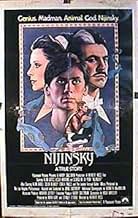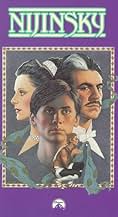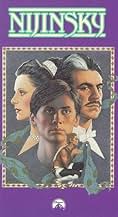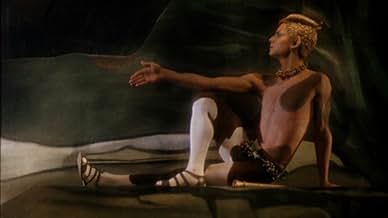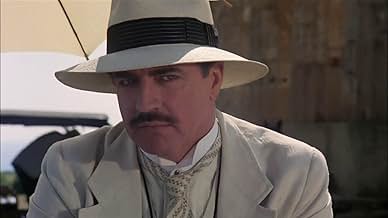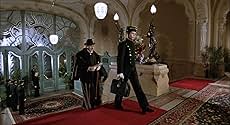Ajouter une intrigue dans votre langueThe story of Vaslav Nijinsky, who is widely believed to be one of the greatest ballet dancers of all time. Based on Romola Nijinsky's "Last Years Of Nijinski.The story of Vaslav Nijinsky, who is widely believed to be one of the greatest ballet dancers of all time. Based on Romola Nijinsky's "Last Years Of Nijinski.The story of Vaslav Nijinsky, who is widely believed to be one of the greatest ballet dancers of all time. Based on Romola Nijinsky's "Last Years Of Nijinski.
- Réalisation
- Scénario
- Casting principal
Tomaso Milian Jr.
- Young Boy on Beach
- (as Tomas Milian Jr)
Avis à la une
Acclaimed ballet dancer Vaslav Nijinsky, the "Polish peasant" who became the toast of Europe in the early 1900s, isn't very well served by this meandering biography which looks and sounds good but seems internally stultified. Nijinsky (played as a spoiled child by newcomer George De La Pena) attempts to extend his talents to the choreography of his latest showcase, under the tutelage of his lover and partner Sergei Diaghilev (Alan Bates), but cracks under the enormous pressure to be brilliant; meanwhile, a budding ballerina schemes her way into Nijinsky's arms after the star and his impresario have a romantic falling-out. Director Herbert Ross, apparently still riding the high from his 1977 ballet-themed drama "The Turning Point", has no new ideas on how to stage an electrifying or kinetic dance performance; the music direction is strong, however the magic of a timeless presentation is missing (what should have been the movie's strongest asset is in fact its weakest link). The temperament of artists in general is well-observed (if a bit over-the-top), however the love story between dancer and producer fails to come off. 1980 may still have been too early in the game to show passion between two men; Ross gives us a chaste rendering of it, followed by what seems like years of sniping and jealousy between the couple. Leslie Browne (a hold-over from "The Turning Point") never begins to suggest the cunning ambitions of a woman who hoped to 'change' Nijinsky', while the passion in that heterosexual union is confined to a single scene. What was everyone so bashful about? A brilliant little light show during the end credits is far more sparkling than anything in the rest of the film! *1/2 from ****
I consider this film a failure. It fails at being a good biopic about Nijinsky, as the facts are far too skewed in this telling. Part of this is because source material was sorely limited at the time, but it doesn't even match up with what was available. It fails at being a dance movie, as what little ballet is shown is unfortunately not filmed very well, with the worst offense being a choppy slow motion effect that ruins the climactic leap at the end of Spectre of the Rose. I can't fathom why the director, a former choreographer, would make such a stupid choice.
Those of you saying this film was "brave" for attempting to portray a gay romance on screen in 1980 - did we watch the same movie? The only kiss between two men in this involves a goofy and obvious gimmick with a tissue to avoid censorship, and besides that the relationship between the real Diaghilev and Nijinsky was far from romantic. It was an exploitative business transaction that quickly soured when Nijinsky decided to marry.
The film tries to cover a period of ten years in just two hours, which leads to idiotic insinuations, such as Nijinsky going mad because he sexually repressed himself, or because his brother was "insane" . The man was a schizophrenic; nothing specific actually caused his illness. The stress of not being able to find work after Diaghilev fired him for marrying Romola likely did exacerbate it along with other factors. But the fact remains that he was married to her for five years and had a child by her before he was institutionalized; saying he went crazy because of their marriage is ridiculous.
Okay, I'll throw the non-history buffs a bone. I know that most biopics play fast and loose with the truth, but this movie is just not good or enjoyable to watch even as a piece of entertainment. The acting is often melodramatic to the point of being cringe-worthy. Alan Bates as Diaghilev is good, but George de la Pena and Leslie Browne are very poorly cast as an overwrought Nijinsky and simpering Romola. The script contains a lot of really dumb moments (I laughed hysterically during the film's only "sex scene" which is soundtracked with Stravinsky's The Rite of Spring, as well as the cabin-trashing scene that is reminiscent of Tommy Wiseau's The Room), scenes which don't make a whole lot of sense, and throwaway lines which don't factor into the plot or mean anything later. Nijinsky kisses his female ballet partner (who is presented as an amalgam fulfilling the roles his partner Tamara Karsavina and his sister Bronia filled in real life) on the lips, and I guess it's supposed to be our first sign that he is trying to rebel against his nature and Diaghilev, but the scene ends awkwardly and nothing actually comes of it. So what was the point of the scene?
If you are curious about Nijinsky and the Ballet Russes and really want to see a movie version, go watch the BBC production Riot at the Rite - it's free on YouTube. Otherwise, this movie is pretty much irrelevant and I can't recommend it.
Those of you saying this film was "brave" for attempting to portray a gay romance on screen in 1980 - did we watch the same movie? The only kiss between two men in this involves a goofy and obvious gimmick with a tissue to avoid censorship, and besides that the relationship between the real Diaghilev and Nijinsky was far from romantic. It was an exploitative business transaction that quickly soured when Nijinsky decided to marry.
The film tries to cover a period of ten years in just two hours, which leads to idiotic insinuations, such as Nijinsky going mad because he sexually repressed himself, or because his brother was "insane" . The man was a schizophrenic; nothing specific actually caused his illness. The stress of not being able to find work after Diaghilev fired him for marrying Romola likely did exacerbate it along with other factors. But the fact remains that he was married to her for five years and had a child by her before he was institutionalized; saying he went crazy because of their marriage is ridiculous.
Okay, I'll throw the non-history buffs a bone. I know that most biopics play fast and loose with the truth, but this movie is just not good or enjoyable to watch even as a piece of entertainment. The acting is often melodramatic to the point of being cringe-worthy. Alan Bates as Diaghilev is good, but George de la Pena and Leslie Browne are very poorly cast as an overwrought Nijinsky and simpering Romola. The script contains a lot of really dumb moments (I laughed hysterically during the film's only "sex scene" which is soundtracked with Stravinsky's The Rite of Spring, as well as the cabin-trashing scene that is reminiscent of Tommy Wiseau's The Room), scenes which don't make a whole lot of sense, and throwaway lines which don't factor into the plot or mean anything later. Nijinsky kisses his female ballet partner (who is presented as an amalgam fulfilling the roles his partner Tamara Karsavina and his sister Bronia filled in real life) on the lips, and I guess it's supposed to be our first sign that he is trying to rebel against his nature and Diaghilev, but the scene ends awkwardly and nothing actually comes of it. So what was the point of the scene?
If you are curious about Nijinsky and the Ballet Russes and really want to see a movie version, go watch the BBC production Riot at the Rite - it's free on YouTube. Otherwise, this movie is pretty much irrelevant and I can't recommend it.
Whatever the facts may have been, the screenplay writers here have chosen to interpret the end of Nijinsky's dazzling career and his descent into madness, as being caused by the end of his romantic relationship with Diaghilev. An interesting premise - that what appeared to most people to be a simple case of a "dirty old man" exploiting a young man's ambition (or perhaps an ambitious young man exploiting an older man's lust), was in fact a genuine love affair. They weren't using each other, they genuinely loved each other.
Sadly, in 1980, it appears the film-makers were not brave enough to explore this fully enough for the film to work. The characters talk about passion a lot, but we don't see it much. Indeed the only love scene between the two men involves a couple of little kisses with a handkerchief held to their lips! How wonderful it would have been to see these two men genuinely passionate with each other - physically and spiritually - and how they managed to turn that passion into great works of art. This way we could understand Nijinsky's devastation when Diaghilev rejects him. As it stands, it seems to come from nowhere.
This is no fault of the actors. Both Alan Bates and George De La Pena do what they can, with the scenes that they have. What a shame the film wasn't made a few years later, when gay relationships could be explored on screen more completely. This could have been one hell of a film. As it is, the ballet reconstructions are excellent and the costumes superb. Performances are strong, with the possible exception of Leslie Browne, who is a little out of her depth here as the scheming rich girl chasing Nijinsky. She fared much better in Herbert Ross' earlier ballet film THE TURNING POINT.
Herbert Ross was a terrific choice to direct the film, having been a professional ballet director and choreographer, and the film has a superb sense of period and great style. But the heart is missing. The racing heartbeats of two men, and two great artists, madly in love.
Sadly, in 1980, it appears the film-makers were not brave enough to explore this fully enough for the film to work. The characters talk about passion a lot, but we don't see it much. Indeed the only love scene between the two men involves a couple of little kisses with a handkerchief held to their lips! How wonderful it would have been to see these two men genuinely passionate with each other - physically and spiritually - and how they managed to turn that passion into great works of art. This way we could understand Nijinsky's devastation when Diaghilev rejects him. As it stands, it seems to come from nowhere.
This is no fault of the actors. Both Alan Bates and George De La Pena do what they can, with the scenes that they have. What a shame the film wasn't made a few years later, when gay relationships could be explored on screen more completely. This could have been one hell of a film. As it is, the ballet reconstructions are excellent and the costumes superb. Performances are strong, with the possible exception of Leslie Browne, who is a little out of her depth here as the scheming rich girl chasing Nijinsky. She fared much better in Herbert Ross' earlier ballet film THE TURNING POINT.
Herbert Ross was a terrific choice to direct the film, having been a professional ballet director and choreographer, and the film has a superb sense of period and great style. But the heart is missing. The racing heartbeats of two men, and two great artists, madly in love.
The film was made shortly after the death of Romola Nijinskaya, the wife of the legendary dancer, as if the producers just had waited for her death to be able to make the film. It is very carefully done, sticking meticulously to the well documented case as it was lovingly presented by his wife herself in her two books about her famous husband. It's a sad story, of course, if not even like a Greek tragedy, and the film admirably tries to embrace and make the tragedy conceivable, by going into details about the passions of Diaghilev, Nijinsky, Fokine, the lovely Karsavina (the most sympathetic of them all) and Romola. But the chief asset of the film is the great acting by them all, including Ronald Pickup as Stravinsky ('a very dry man' according to Nijinsky, who didn't like him at all,) Alan Badel at his best as the Baron Ginzburg, Jeremy Irons as Fokine, the adorable Carla Fracci as Tamara Karsavina, and above all Alan Bates as a superb Diaghilev, quite human in all his necessary monstrosity as an impresario with too many eccentric characters under his wings, and George de la Pena as an almost painfully true and convincing Nijinsky. To this comes the wonderful ballet performances, including "The Spectre of the Rose" (Nijinsky's tour de force) and "The Afternoon of a Faun", the crucial turning point in his career from only dancer to controversial choreographer. Deserving the highest merit of all is the most admirable reconstruction of the ballets russes at that time with the fabulous art works of Leon Bakst, Diaghilev's unique scenographer, turning all Fokine's and Nijinsky's ballets into sumptuous living fairy tales of fantastic dancing, perhaps most clearly illustrated by Rimsky-Korsakov's "Sheheradzade", which music finally crowns the film in the end, which is needed, since, as I said, it's a sad story, but it couldn't have been made better. The only objection that would be relevant is the failure of making Nijinsky's lapse into madness credible. It was actually a long process, he wasn't definitely past hope until 1917 (4 years after the end of the film), and the main reason was not the crises of his relationships but the impact on him by the First World War. This important piece in the puzzle is missing in the film. Instead you see him ending up in a strait-jacket without further explanation.
It's a great film none the less, and as time goes by it will certainly win the acclaim it deserves as one of the great ballet film classics, second only to "The Red Shoes" 1948 and "The Specter of the Rose" 1946, which actually also is a masked portrait of Nijinsky (see my review of that film).
It's a great film none the less, and as time goes by it will certainly win the acclaim it deserves as one of the great ballet film classics, second only to "The Red Shoes" 1948 and "The Specter of the Rose" 1946, which actually also is a masked portrait of Nijinsky (see my review of that film).
Nijinsky (1980) -
I couldn't actually remember whether I had checked the synopsis for this film beforehand and whether it might have been about a horse instead. My Mother certainly insisted on telling me that there was also a horse called Nijinsky all the way through it, despite it obviously being about the ballet dancer.
Either way, I knew nothing about the man, well played by George De La Pena and now I know something. He seemed like a bit of a diva actually and although it was clear that Sergei was using him for his talents, at least to some degree and that their love might not have been true, I felt that the dancer was probably doomed to come to the end that he did due to his passion and determination that would only ever be disappointed.
The character of Sergei, who was the lover and benefactor, didn't look like the Alan Bates I knew. I would still have kissed him though, without the use of a handkerchief between our lips, as was the oddity of their first meeting on screen.
There had always been something roguishly charming about Mr. Bates, especially when he had his beard and that came across in this great and interesting character, which was well delivered.
I would have liked to have seen more of Nijinsky actually dancing, although the Faun performance was a bit odd and lacklustre. More a sort of strange rolling around than the traditional beauty of a ballet that I'm used to. Actually, most of the dances were too strange for me and I was disappointed, having only recently started to get in to the art form via the likes of 'Swan Lake' and 'The Nutcracker', but also 'Car Men' and an old BBC2 performance I saw entitled 'Enter Achilles' from a season they did named '2 Dance'. Perhaps what was shown in this film would be received positively by those that knew more, but for myself as a layman it just came across as a bit forced and daft.
However I would have been very surprised if anyone could choreograph any kind of dance to Igor Stravinsky's (Ronald Pickup) God awful music, as it was performed in this film. It was painful to listen to.
Other than that, I thought that this story of Vaslav Nijinsky's life was produced fairly well. I would definitely have liked more sex and nudity, but I understood the restrictions that the studio would have been under at the time.
However I did also think that it was very poorly lit, making it very dark throughout and therefore lacking in definition at times, or perhaps it may have been the quality of the film used, but it definitely needed something.
In general it was interesting and it kept my attention, which many other films have failed to do. The final moments appeared a bit rushed as if they had sacrificed filming that segment of his life due to time constraints, because it was sad and that did lead me to thinking that it was a poor end for both Nijinsky and the film.
640.89/1000.
I couldn't actually remember whether I had checked the synopsis for this film beforehand and whether it might have been about a horse instead. My Mother certainly insisted on telling me that there was also a horse called Nijinsky all the way through it, despite it obviously being about the ballet dancer.
Either way, I knew nothing about the man, well played by George De La Pena and now I know something. He seemed like a bit of a diva actually and although it was clear that Sergei was using him for his talents, at least to some degree and that their love might not have been true, I felt that the dancer was probably doomed to come to the end that he did due to his passion and determination that would only ever be disappointed.
The character of Sergei, who was the lover and benefactor, didn't look like the Alan Bates I knew. I would still have kissed him though, without the use of a handkerchief between our lips, as was the oddity of their first meeting on screen.
There had always been something roguishly charming about Mr. Bates, especially when he had his beard and that came across in this great and interesting character, which was well delivered.
I would have liked to have seen more of Nijinsky actually dancing, although the Faun performance was a bit odd and lacklustre. More a sort of strange rolling around than the traditional beauty of a ballet that I'm used to. Actually, most of the dances were too strange for me and I was disappointed, having only recently started to get in to the art form via the likes of 'Swan Lake' and 'The Nutcracker', but also 'Car Men' and an old BBC2 performance I saw entitled 'Enter Achilles' from a season they did named '2 Dance'. Perhaps what was shown in this film would be received positively by those that knew more, but for myself as a layman it just came across as a bit forced and daft.
However I would have been very surprised if anyone could choreograph any kind of dance to Igor Stravinsky's (Ronald Pickup) God awful music, as it was performed in this film. It was painful to listen to.
Other than that, I thought that this story of Vaslav Nijinsky's life was produced fairly well. I would definitely have liked more sex and nudity, but I understood the restrictions that the studio would have been under at the time.
However I did also think that it was very poorly lit, making it very dark throughout and therefore lacking in definition at times, or perhaps it may have been the quality of the film used, but it definitely needed something.
In general it was interesting and it kept my attention, which many other films have failed to do. The final moments appeared a bit rushed as if they had sacrificed filming that segment of his life due to time constraints, because it was sad and that did lead me to thinking that it was a poor end for both Nijinsky and the film.
640.89/1000.
Le saviez-vous
- AnecdotesExecutive Producer Harry Saltzman had wanted to make a movie about Nijinsky for many years, first attempting to produce a version in 1970 with partner Albert R. Broccoli. The movie was started, but was never finished, it being cancelled by Broccoli and Saltzman. It is known as Nijinsky: Unfinished Project (1970). It starred Rudolf Nureyev, was written by Edward Albee, and directed by Tony Richardson.
Meilleurs choix
Connectez-vous pour évaluer et suivre la liste de favoris afin de recevoir des recommandations personnalisées
- How long is Nijinsky?Alimenté par Alexa
Détails
Box-office
- Montant brut aux États-Unis et au Canada
- 1 047 454 $US
- Montant brut mondial
- 1 047 454 $US
- Durée2 heures 9 minutes
- Couleur
- Mixage
- Rapport de forme
- 1.85 : 1
Contribuer à cette page
Suggérer une modification ou ajouter du contenu manquant




